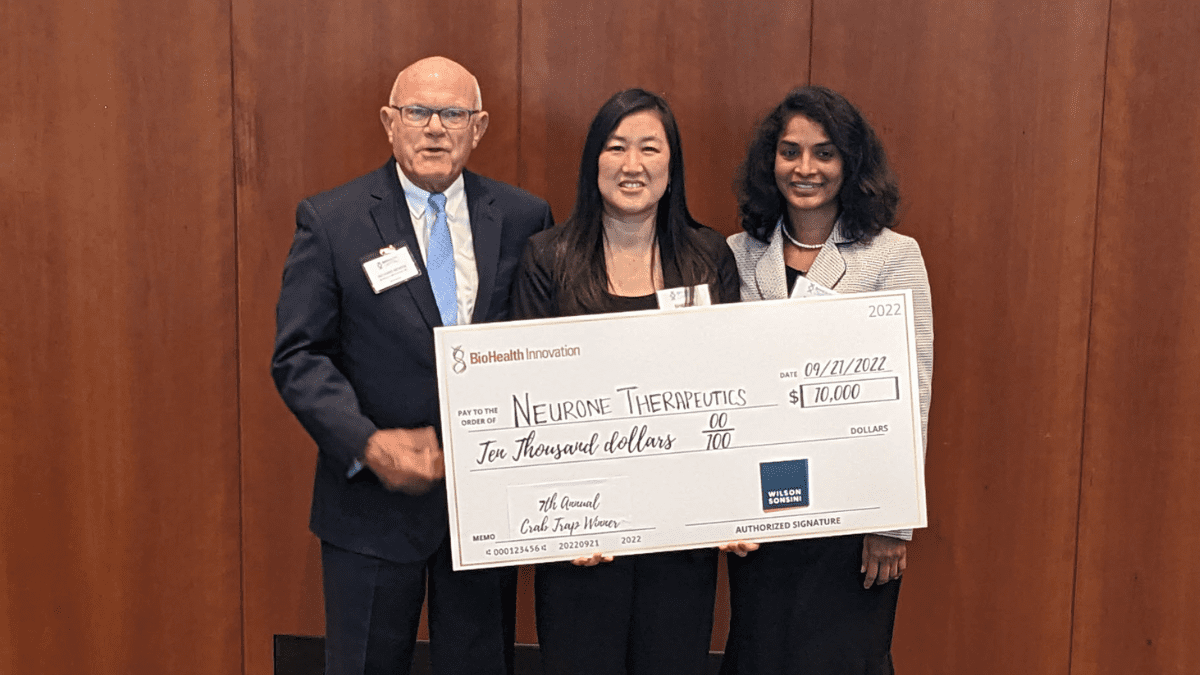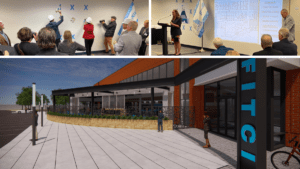
(Photo: BioHealth Innovation)
Neuroene Therapeutics Wins 7th Annual Crab Trap Competition
Washington D.C.-based Neuroene Therapeutics and its approach to treating a rare form of epilepsy were crowned the winner of the seventh annual Crab Trap Competition, which highlights the commercialization potential of biohealth technologies throughout the BioHealth Capital Region.
The company was largely recognized for its lead asset, NT102, a Vitamin K analog demonstrating broad seizure protection in preclinical animal models. In particular, the asset showed protection against seizures in Dravet syndrome, a rare genetic disease marked by severe encephalopathy and epilepsy that doesn’t respond well to current medications.

Last year the FDA awarded Orphan Drug designation to NT102, a designation granted to certain medications that are being developed to treat diseases that affect fewer than 200,000 patients in the U.S. And just a few months ago Neuroene became a JLABS resident.
NT102 has the potential for broad applications beyond Dravet syndrome. Sherine Chan, a co-founder of Neuroene, noted that about one-third of epilepsy patients being treated for their condition still do not have adequate control of their seizures. With its unique mechanism of action, Chan said the company envisions NT102 as both an adjuvant treatment to some existing epilepsy medications as well as a medical countermeasure for nerve agent exposures that cause seizures.
A Look Inside the Cage
Other Crab Trap finalists included Kubanda Cryotherapy, Perfusion Medical, Polaris Genomics, and VPIX Medical.
On Sept. 21, representatives from each company had just seven minutes to tout their company’s developmental programs and business plans to a panel of prominent industry funding experts and executives. To be considered for the award, the companies had to meet several criteria, including a demonstrated proof of concept, previous funding, an understanding of regulatory pathways, and a clear path to market.
Prior to their presentations, Rich Bendis, the President & Chief Executive Officer of BioHealth Innovation, Inc. praised the contenders, noting that the quality of this year’s companies and programs was “as good as we’ve ever had from the finalists.” The prize package for the winner includes a $10,000 cash prize from Wilson Sonsini as well as a $5,000 cash prize from Montgomery County. Additionally, the winner enjoys preclinical CRO services from Noble Life Sciences and a one-year residency at JLABS @ Washington, D.C.

Since Neuroene is already a JLABS resident, that honor was instead offered to Polaris Genomics, which is developing molecular diagnostics for mental health care. Based in Gaithersburg, Polaris has developed an RNA panel, TruGen-1, that accelerates the research, development, and evaluation of mental health diagnostics and novel therapeutics.
Polaris CEO Charles Cathlin shared TruGen-1’s potential with the judges, noting that the company is initially focused on using its tools to treat post-traumatic stress disorder. In addition to TruGen-1, the company has clinical screening tools that measure RNA expression from blood for 20 proprietary genetic markers. Cathlin noted during his presentation that the PTSD market is valued at over $2.6 billion, especially when the military is factored into the equation.
RELATED: BioHealth Capital Region Forum Crab Trap Winners: Where Are They Now?
Other finalists included Baltimore-based Kubanda Cryotherapy, which is developing a low-cost cryotherapy device for treating veterinary tumors. With the company’s approach, CEO Bailey Surtees said pets will be able to skip traditional surgery for tumors and have them frozen off with this treatment. She noted that no general anesthesia is required and skilled technicians can perform the treatment.
“You trade a knife for a needle. Cryotherapy leads to happy pets, happy vets, and happy families,” she said.
Perfusion Medical is focused on commercializing PEG-20k, a breakthrough IV solution for the restoration of tissue. The asset is primarily being developed as a solution for major blood loss and hemorrhagic shock. Beyond that, CEO Gerard Eldering said there are multiple applications for PEG-20k, including sepsis.
VPIX Medical has developed a real-time, digital biopsy platform, which enables surgeons to perform enhanced cancer surgery. Heejoon Um, a company director, said this platform will allow tumor pathologies to be conducted in real-time as the images are immediately transferred from the operating table to the pathologist. With an 89% sensitivity, he said it cuts down on the time during an operation to have a biopsy conducted.




